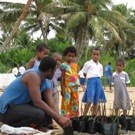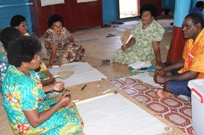Loraini Sivo (Fiji) and Fatema Rajabali (UK) developed a project with a community of people in the village called Yadua. Here’s a description of the problem the community members faced based upon participatory needs assessment:
200 people in the village of Yadua, Fiji are suffering from increase erosion of shoreline caused by increase wave actions due to the reduction of mangrove forest and a reef which acts as buffers – and climate change induced rising sea levels which contributes to loss of houses, arable land and housing sites and sedimentation caused by soil erosion that smothers the fish level. Due to this, a marine ecosystem shift is occurring with corals dying and in turn less fish found by the reef. As the Yadua rely on fishing for their livelihood, this affects livelihoods and leads to a reduction in their ability to lead the productive, meaningful, prosperous lives they need to leave the cycle of poverty and contribute to the development of their community.
| Mangrove nursery that community members were starting to establish after our 1st workshop with them | |
 |
Loraini presented the project to the GEF Small Grants program and was awarded $40,000 grant for her project. Says Loraini: |
“The course OL 341 helped me develop a concept for Yadua on a small scale ecosystem-based adaptation climate change project which was then submitted to GEF Small Grants. The course had also helped me identify the processes to use in terms of assessing the needs of the community and in helping the communities to identify impacts affecting them that was related to climate change. I first conducted a need assessment which I had also incorporated the sharing of some very basic climate change science as part of awareness. The two key needs that communities had identified were coastal erosion around the island but most importantly in front the village location and the availability of food on the island through certain times of the year. After a few consultation meetings with GEF, they informed me that they were willing to fund the project.
Through this funding Yadua has now set-up a costal restoration project which includes the planting of mangroves and coastal plants in the affected areas and also the development of community garden to act as food source for the community. In the last 10 months, a lot of awareness and training programs have been conducted on Yadua as part of the project activities and community members have been very much engaged into the whole project.
Various experts from the agriculture, forestry and food & nutrition sector have been part of the team providing trainings to communities. A committee made up of 8 ppl has been developed on the island to look after the overall project implementation and they are working very closely with our partner organization, National Trust, to ensure consistent reporting of the project status. The 8ppl in the committee are made up youths, women and men from the community. Through the course of the project, Yadua will be developing its Costal Forest Management Plan and a Code of Conduct for Sustainable Farming Practices. I am using the same site for the OL343 course.”
Project Outline: Problem list & potential interventions/activities/solutions
Problem 1. Increasing erosion of shoreline caused by increase wave actions
Ecosystem based adaptation program [Solution to underlying cause: wave impacts at high tide and rising sea level]
[Activity 1]. Workshop on values of the ecosystem as natural buffers and coastal processes
[Activity 2]. Land use management workshop and follow up
[Activity 3]. Workshop on habitat restoration technique – mangroves and artificial reefs
[Activity 4]. Coastal management planning workshop and follow up
| Community members voting during needs assessment. | |
 |
A meeting was conducted with 5 men and 5 women from Yadua who were either active outdoor people or have lived most of their live on the island because these are the people that would recognize change around them and take notice of impacts on the local environment more than the others, if there were any. |
|
Follow these links to see: |
|
Please write us with your stories, thoughts and comments through Online.Learning@csd-i.org